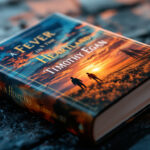Love You Forever by Robert Munsch – A Heartfelt Book Review for All Ages
“Love You Forever” by Robert Munsch isn’t just a children’s book—it’s an emotional journey that’s touched millions since its release in 1986. With a simple yet powerful story, it celebrates the unbreakable bond between parent and child as they grow through life’s stages. Loved by some for its heartfelt message and critiqued by others for its intense imagery, this book has sparked countless conversations over the years. Its enduring relevance lies in its ability to evoke raw emotion, making it a classic that resonates across generations.
Overview of “Love You Forever”
“Love You Forever” by Robert Munsch is more than just a children’s book—it’s an emotional experience that encapsulates the enduring love between parent and child. This heartfelt story has stood the test of time, capturing readers’ hearts with its simplicity and emotional depth.
A Story That Spans Generations
At its core, “Love You Forever” is a tale that illustrates the cyclical nature of life and love. The story follows a mother as she nurtures her son through various stages of his life—from infancy to adulthood. At every stage, she sings a touching lullaby:
“I’ll love you forever,
I’ll like you for always,
As long as I’m living,
My baby you’ll be.”
The narrative’s power lies in its ability to mirror the journey of parenthood. It portrays moments of joy, frustration, and, ultimately, the bittersweet realization that time changes everything. As the roles reverse in later years, and the grown child begins caring for his aging mother, readers are reminded that love transcends age and is an ongoing cycle. It’s a universal theme that resonates deeply with families of all backgrounds. Understanding how the book masterfully touches on themes of love, loss, and the passage of time explains why it holds such cultural significance. You can read more about the story’s timeless appeal on SuperSummary.
The Creation Behind the Story
The origins of “Love You Forever” make the book’s message even more profound. Robert Munsch revealed that the book was inspired by personal loss. The iconic lines that form the lullaby initially began as a private poem written after Munsch and his wife experienced the devastation of losing two stillborn babies. The emotion embedded in these words is palpable, helping explain why the book resonates with readers of all ages.
Munsch has often shared how this story was a way to process his grief and honor the connection between parent and child. It’s remarkable how he translated such a deeply personal experience into a universally relatable story. This backstory adds layers of depth to the book, offering readers insight into the heartfelt inspiration behind its creation. More on this poignant history can be found in this reflective piece by HuffPost.
By connecting the story to Munsch’s personal life, “Love You Forever” moves beyond being a simple children’s book, elevating it into an enduring symbol of love and resilience.
The Emotional Resonance of “Love You Forever”
Few books have managed to evoke the kind of emotional response that “Love You Forever” by Robert Munsch does. Its tender narrative and profound message about the enduring love between a parent and child consistently strike a chord with readers of all ages. However, the book has also garnered its share of criticism, sparking debates about its themes and imagery. Let’s explore the aspects that make this book so cherished and the controversies that have polarized readers.
Why Readers Cherish It
There’s no denying the emotional weight of “Love You Forever.” Many readers hold it close to their hearts for the way it beautifully portrays unconditional love across generations. The repetitive lullaby sung by the mother—“I’ll love you forever, I’ll like you for always, As long as I’m living, my baby you’ll be”—has become emblematic of an unwavering bond that transcends time.
What makes it resonate so profoundly?
- Relatable Parenting Journey: The book captures the highs and lows of raising a child, from tantrums to tender moments. Parents often see their own experiences reflected in the pages.
- Generational Love: It shows the cyclical nature of care, transitioning from the mother caring for her son to the son caring for his aging mother. This progression mirrors a universal truth that many families experience.
- Raw Emotion: Readers often find their own feelings of love and loss mirrored in the story. It’s a reminder of life’s fleeting nature and the importance of cherishing loved ones.
Parents frequently share how reading this book has brought them to tears, often because it mirrors their own relationships with their children or their parents. The emotional pull is undeniable, cementing its place as a cherished classic. For a deeper dive into why some people adore this book, check out this thoughtful exploration.
The Criticisms and Controversies
While many embrace “Love You Forever,” others find certain aspects of the book unsettling or overly sentimental. Its heartfelt narrative has sparked debates, particularly surrounding specific imagery and the depiction of parental love.
What are people saying?
- “Creepy” Scenes: One of the most critiqued parts is when the elderly mother drives to her adult son’s home, climbs a ladder, and holds him while he sleeps. While symbolic to some, others view it as a literal depiction of overbearing, almost invasive behavior. These moments have been labeled as “unsettling” or “awkward” by critics and parents alike. This Reddit discussion highlights some divergent opinions.
- Emotional Overload: For some, the book is too emotionally intense, particularly for young readers. The cycle of life and death, while poignant, can feel heavy when presented through such stark imagery. A recent debate in Motherly showcases how divisive the emotional tone can be.
- Unrealistic Depictions: The tableau of a mother climbing into an adult child’s room has also sparked discussions about its realism. Critics argue that the metaphorical intention might be lost on some readers, making the behavior feel unnatural or even inappropriate.
These criticisms don’t diminish the book’s overall impact but rather highlight the diverse ways readers interpret its narrative. For an insightful look at how the book has sparked ongoing online debates, read this New York Post article.
The divide in opinion underscores the complexity of “Love You Forever.” While some adore its heartwarming message, others struggle with its more unconventional elements. This duality is part of what’s kept the book so relevant for decades.
Symbolism and Interpretations
“Love You Forever” by Robert Munsch is much more than a simple story about a mother and her child—it’s a poetic exploration of love’s deeper meanings. Beneath its simple words and illustrations lies profound symbolism, touching on themes of bonds that transcend time, the cyclical nature of care, and the emotional legacies passed through generations.
The Symbolism of the Lullaby
At the heart of the book is its recurring lullaby:
“I’ll love you forever,
I’ll like you for always,
As long as I’m living,
My baby you’ll be.”
This lullaby acts as a thread, binding the narrative from start to finish. On the surface, it’s a tender expression of a mother’s love, but it also symbolizes the unwavering connection between parent and child that endures through every stage of life. It doesn’t matter if the child grows into a tantrum-throwing toddler or a moody teenager. This song reminds readers that parental love is constant, weathering life’s emotional storms.
The lullaby also represents the universal truth of unconditional love—something many parents feel but can’t always articulate. It’s repetitive in the story because that’s how love often operates—steadily and consistently, even when tested. While some may interpret the mother’s actions literally, the singing, especially in her son’s adulthood, can be seen as a metaphor for how love transcends the boundaries of space, time, and behavior. For a closer look at how this resonates, Mamamia explores the emotional depth this lullaby embodies.
By including this lullaby throughout the book, Munsch cleverly combines words and rhythm to illustrate love as a secure anchor amidst life’s inevitable changes.
Generational Love and Legacy
The story doesn’t just stop at a mother loving her child—it ventures into the broader theme of how love is passed down through generations. By the end of the book, when the roles reverse, and the son cradles his mother while singing the lullaby, this cyclical portrayal of caregiving becomes clear. It highlights this essential truth: love is not confined to one generation. It evolves and creates ripples that influence family legacies.
This theme resonates with families worldwide because it reflects the reality of life. Many of us eventually care for the parents who once cared for us—a bittersweet but profound transition. It also emphasizes the emotional inheritance we provide, nurturing the next generation with the same love and values.
Beyond the parent-child relationship, this concept of generational love invites reflection on the broader legacies left behind. These legacies aren’t measured by wealth or achievements but by the love and lessons imparted. For a touching example of how this plays out in families, Her View From Home shares a heartfelt story about love’s enduring impact across generations.
“Love You Forever” reminds us that the love shared within a family doesn’t just end—it lives through actions, memories, and, in this case, a simple yet powerful lullaby.
Why “Love You Forever” Stands Out
Robert Munsch’s “Love You Forever” is not just another children’s book—it’s a timeless masterpiece that transcends the norms of storytelling. What makes it truly remarkable is its emotional resonance, thoughtful narrative approach, and ability to appeal to readers of all ages. Let’s explore the elements that set this book apart.
A Unique Narrative Style
“Love You Forever” employs a storytelling method that’s both repetitive and lyrical, which immediately captivates its audience. The story is built around a comforting lullaby that the mother sings to her son at every stage of his life:
“I’ll love you forever,
I’ll like you for always,
As long as I’m living,
My baby you’ll be.”
This blend of repetition and melody makes the narrative feel almost musical, resonating deeply with readers. It’s not just a tale to read but an experience to share, often out loud. The cyclical structure of the story mirrors the cycles of love, care, and life itself, creating a profound emotional connection with the reader.
Unlike many children’s books that stick to a singular phase of life, Munsch’s story evolves alongside the characters. From infancy to adulthood, the mother’s love remains constant. This dynamic approach keeps the audience engaged and emotionally invested.
The book’s subtle but deliberate use of rhythm and repetition is part of what makes it so memorable. It’s as though the story is designed to be remembered—passed down through generations like a cherished family tradition. If you’re interested in more on how Robert Munsch’s tales uniquely connect with readers, check out this insightful review from Kids Book Café.
A Book for All Ages
What truly sets “Love You Forever” apart is its universal appeal. While it may be categorized as a children’s book, its themes and emotional undercurrents resonate just as strongly, if not more, with adults. Why is that? The story reflects universal truths about unconditional love, the passage of time, and the cyclical nature of caregiving.
Children adore the silly and tender moments with the mischievous son and his loving mother. But for adults, the story holds deeper meaning. Parents especially feel the weight of those years that pass too quickly, where toddlers become teenagers, and eventually, grown children. The book gently reminds us of the precious, fleeting nature of these moments.
- Nostalgia for Adults: Many adults find themselves reflecting on their own relationships with their parents or children. It’s a rare book that invites such introspection while remaining accessible to younger readers.
- Generational Emotional Ties: By the end, as the son cradles his aging mother, the story speaks to the unspoken realities and bittersweet beauty of generational caregiving. This isn’t just a story for kids—it’s a reminder for adults about the impact of love through life’s transitions.
This cross-generational magic is a rarity in children’s literature, and it’s why the book remains a beloved classic. For additional perspectives on why this book resonates with readers across ages, check out this thoughtful piece on Great and Noble Tasks discussing its timelessness.
In a world of books tailored to specific age groups, “Love You Forever” shines brightly as a story that brings readers of all stages of life together. Whether it’s a child listening to the soothing lullaby for the first time or an adult revisiting it decades later, its message is clear: love, in its truest form, is unending.
Conclusion
“Love You Forever” by Robert Munsch has cemented itself as a cherished yet thought-provoking staple in children’s literature. Its message of unconditional love, paired with its emotional depth, creates a lasting impression for readers of all ages. Whether you find its imagery comforting or controversial, the book’s ability to spark conversations about family bonds and the cycle of life is undeniably powerful.
As a poignant reminder of life’s fleeting moments, it’s a must-read for families looking to share timeless lessons and heartfelt experiences. If you haven’t yet, pick it up and see how this story resonates with your own journey. Do you see it as a tender tribute—or something more complicated? Share your thoughts and keep the dialogue alive.







